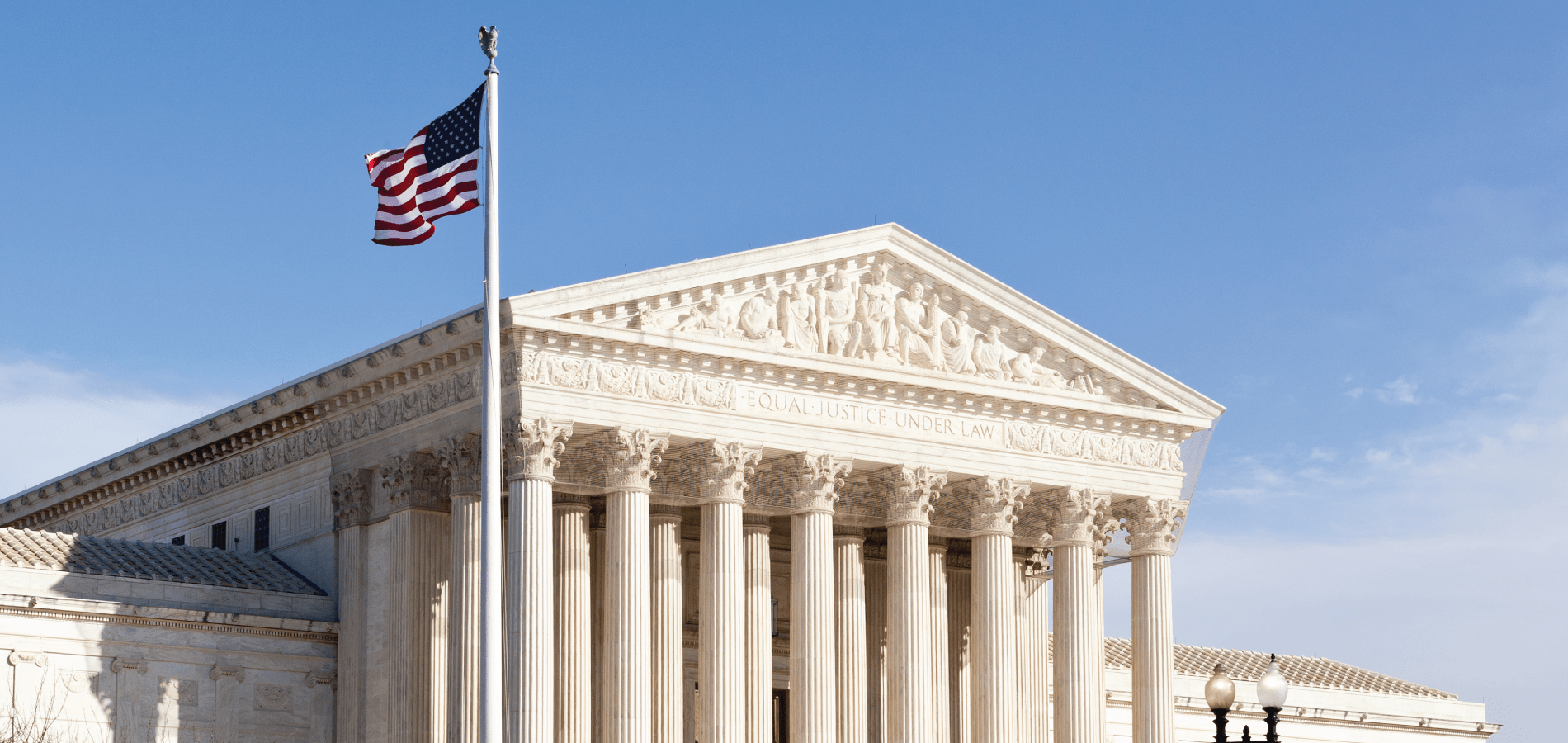In the first seven weeks of 2018, there have been several school shootings in the United States. The latest occurred on Valentine’s Day in Parkland, Florida, where seventeen people were killed. With the latest school shootings, and other mass shootings, there has been on ongoing debate circling gun laws. Let’s take a look at what has been happening and what laws are currently in place.
Timeline of Deadly Shootings
Looking back at the past ten years, there have been seven particularly deadly shootings. Two of the five deadliest shootings took place within a month of each other in late 2017. Here is a brief summary of these shootings:
- April 16, 2007: 23-year-old Seung-Hui Cho, a senior at Virginia Polytechnic Institute and State University in Virginia, killed 32 people on campus before taking his own life. Two years prior to this shooting, Cho was evaluated at a mental health facility as ordered by a judge, after he made suicidal remarks to his roommate.
- December 14, 2012: 20-year-old Adam Lanza killed his mother, Nancy Lanza, in their home in Newtown, Connecticut. He then proceeded to Sandy Hook Elementary School where he killed 20 children and 6 adults. Once the police arrived and approached the school, Lanza took his own life. The Connecticut Office of the Child Advocate released a statement that Lanza had a fascination with mass shootings in addition to deteriorating mental health.
- December 2, 2015: Married couple Syed Rizwan Farook and Tashfeen Malik killed 14 people at a holiday party, hosted by Farook’s employer. Later that day, the couple was killed during a shootout with the police. The couple’s home contained 12 pipe bomb-type devices and hundreds of tools which could be used to construct explosive devices.
- June 12, 2016: 29-year-old Omar Mir Seddique Mateen killed 49 people in a gay nightclub in Orlando, Florida. Mateen was killed as police attempted to free hostages that he was holding captive in the club. Mateen called 911 during the attack to pledge his allegiance to ISIS. Although his family did not believe he was religious, they did express he had anger management problems.
- October 1, 2017: 64-year-old Steven Paddock fired from the 32nd floor of the Mandalay Bay Resort and Casino in Las Vegas into a crowd of more than 20,000 gathered for the Harvest Music Festival, killing 58 people. Paddock then killed himself. Twenty-three weapons were found in the hotel room, including multiple rifles.
- November 5, 2017: 26-year-old Devin Patrick Kelly killed 26 people in a small Baptist church in Texas. When a local resident used his own rifle to engage Kelly, Kelly fled from the church. After a brief car chase, police found Kelly dead in his car. He suffered a shot to the leg and torso from an armed citizen before taking his own life. Kelly was a member of the U.S. Air Force until he was court-martialed in 2012 for assault on his spouse and their child and spent a year in prison.
- February 14, 2018: 19-year-old Nikolas Cruz killed 17 people after opening fire at Marjory Stoneman Douglas High School. Cruz was a former student of the school who was expelled for disciplinary reasons. Cruz had been treated for a period of time at a mental health clinic. Due to a comment left on a YouTube video, the FBI was warned about Cruz and his potential to shoot up a school. In fact, law enforcement agencies received multiple warnings about Cruz’s violent tendencies.
Current Gun Laws
A year ago, President Donald Trump signed a measure which nixed a regulation put in place by former President Barack Obama that aimed to keep guns out of the hands of severely mentally ill people. This regulation was enacted after the shooting at Sandy Hook Elementary School and made it mandatory for the Social Security Administration to release information about mentally ill recipients of Social Security benefits. This information would be available in background checks—and in turn, would prohibit such beneficiaries deemed to have a mental illness from buying a gun. President Trump nullified this rule, stating it endangered the Second Amendment rights of law-abiding citizens.
Gun laws in the United States vary considerably from state to state and regulate the sale, possession, and use of firearms and ammunition. Let’s take a look at Florida, where the recent deadly school shooting took place. Here are some facts about gun laws in the state of Florida:
- You do not need a permit or license to buy a gun.
- You are not required to register a firearm.
- You do not need a permit to conceal carry a rifle or shotgun, but you do need one for a handgun.
- The state Department of Agriculture and Consumer Services must issue a concealed weapons license if the applicant is a U.S. citizen, 21 years or older, and does not have a felony conviction.
- You do not need a state license to sell firearms.
- You can buy as many guns as you want.
- The state requires a three-day waiting period before purchasing a gun.
- The state does not regulate assault weapons, .50-caliber rifles, and large-capacity ammunition magazines.
Although President Trump campaigned as an ally of the National Rifle Association, a statement was released saying “the President is supportive of efforts to improve the federal background check system.” The House passed a bill with a similar provision in December, and the Senate passed a bill with the same proposals. The bill resulted from the shooting in Texas back in November 2017. If implemented, the Senate bill would hold federal authorities accountable to report criminal history records to the National Instant Criminal Background Check System; failure to do so would result in blocking bonus pay for political appointees. Since the federal government cannot force the states to do something under the Constitution, financial incentives will be put in place. Donald Trump has also noted his support for arming teachers as a solution to school safety on his Twitter account.
Relations with the National Rifle Association
In the aftermath of the deadly shootings in Florida, many companies have begun to cut ties with the National Rifle Association (NRA). Advocates are not only targeting weapon makers, but also banks, rental car agencies, airlines, insurers and other companies who have ties to the NRA. Delta Air Lines announced they were ending their discounted rate for NRA members and asked the company to remove their information from their website. Soon after, United Airlines announced they also were no longer offering discounted flights to the NRA annual meeting. Here is a list of companies who have dropped relations with the NRA:
- Delta Air Lines
- United Airlines
- First National Bank of Omaha
- Avis and Budget
- MetLife
- Hertz
- Enterprise Holdings
- SimpliSafe
- TrueCar
- Symantec (SYMC)
Some companies such as FedEx and Amazon, however, have not followed suit. FedEx released a statement on Twitter that while they do not agree with all of the NRA positions, they are not eliminating their discount for NRA members. The hashtag #StopNRAmazon is spreading on Twitter because the NRA has its own official channel streamed through Amazon. To view all the companies who hold an alliance with the NRA, visit their website to search by State and Business Type.
Research This Topic in HeinOnline
On the HeinOnline welcome page, navigate to the Catalog tab. This allows users to search across all the databases in HeinOnline for specific titles. Using this tab, enter Mass Shootings and Terrorism and click the search button.
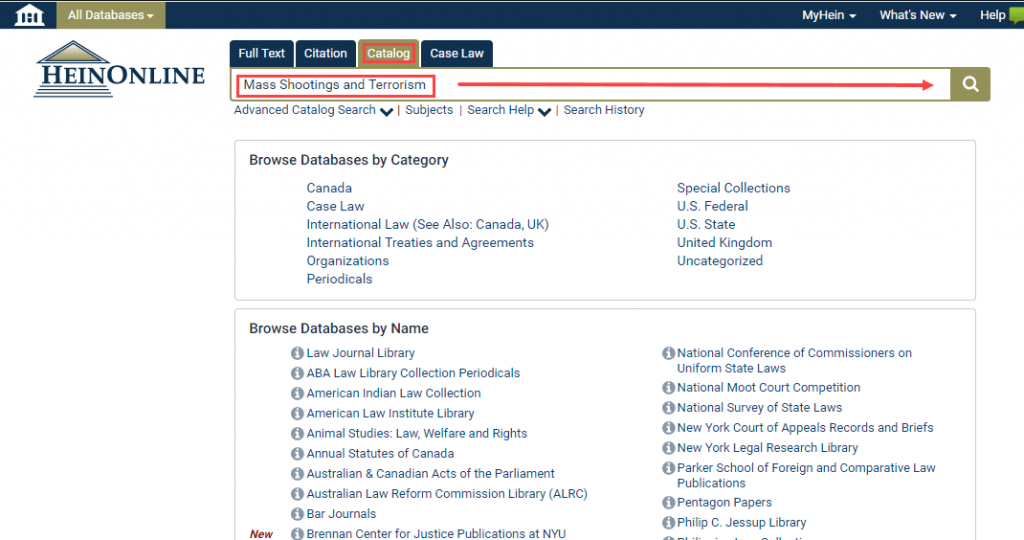
The results include these three CRS reports:
- Mass Shootings and Terrorism: CRS Products from June 13, 2016
- Mass Shootings and Terrorism: CRS products from June 17, 2016
- Mass Shootings and Terrorism: CRS Products from June 24, 2016
The CRS Report from June 24, 2016 references these relevant documents:
- CRS Report R44537, The Orlando Mass Shooting: CRS Experts
- CRS Report R44328, Gun Control: CRS Experts
- CRS Report R44126, Mass Murder with Firearms: Incidents and Victims, 1999-2013.
- CRS Insight IN 10509, Orlando Nightclub Mass Shooting: Gun Checks and Terrorist Watchlists
- CRS Report R42236, Terrorist Watch List Screening and Background Checks for Firearms
- CRS Report R44529, The Terrorist Screening Database: Background Information
- CRS Insight IN 10299, Sifting Domestic Terrorism from Hate Crime and Homegrown Violent Extremism
- CRS Report R44521, The Islamic State’s Acolytes and the Challenges They Pose to U.S. Law Enforcement
- CRS Report R41780, The Federal Bureau of Investigation and Terrorism Investigations
- CRS Report R42536, The Domestic Terrorist Threat: Background and Issues for Congress
- CRS Report R41416, American Jihadist Terrorism: Combating a Complex Threat
- CRS Report R42957, Federal Assault Weapons Ban: Legal Issues
- CRS Legal Sidebar WSLG1598, When Are Violent Crimes Federal Hate Crimes?
- CRS Insight IN 10507, Stafford Act Assistance and Acts of Terrorism
Similarly, use the Catalog tab to search for a word with multiple character differences. For example, search for Mass Shoot* to find variations such a shooting, shootings, shooter.
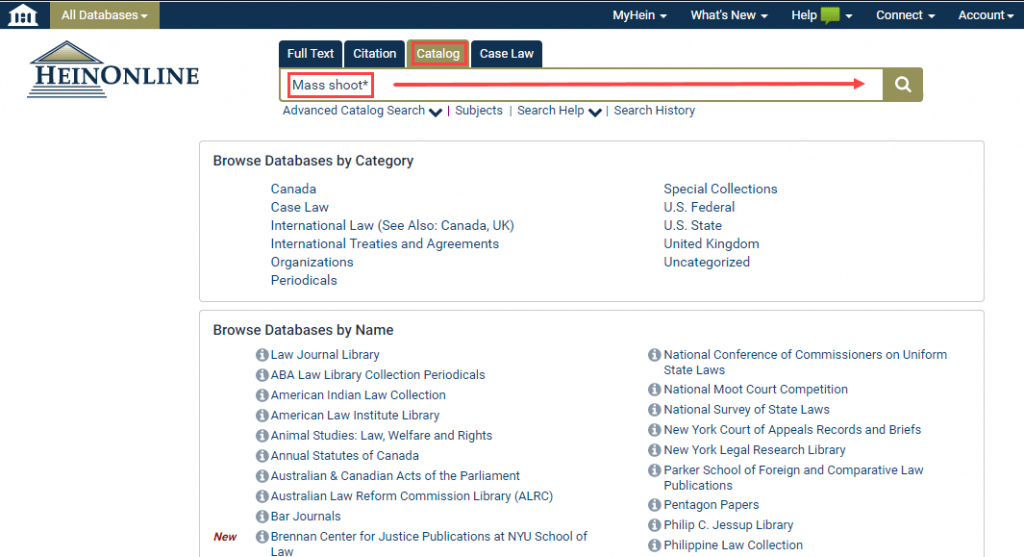
These results include several titles from the U.S. Congressional Documents database. Some of these include documents specific to certain mass shootings, such as Orlando Nightclub Mass Shooting: Gun Checks and Terrorist Watchlists and Charleston, SC, Mass Shooter Might Have Been Denied a Handgun if Not for Possible Recordkeeping Oversights.
Next, navigate to the National Survey of State Laws database. This database allows users to make state-by-state comparisons of current state laws. Within this database, scroll down until you find Gun Control and click on this topic. From here, click on show more to view details about this topic or scroll down to see the different gun laws for each state. To view laws from selected states, check the grey box to the left of each state and click the Show only checked states option.
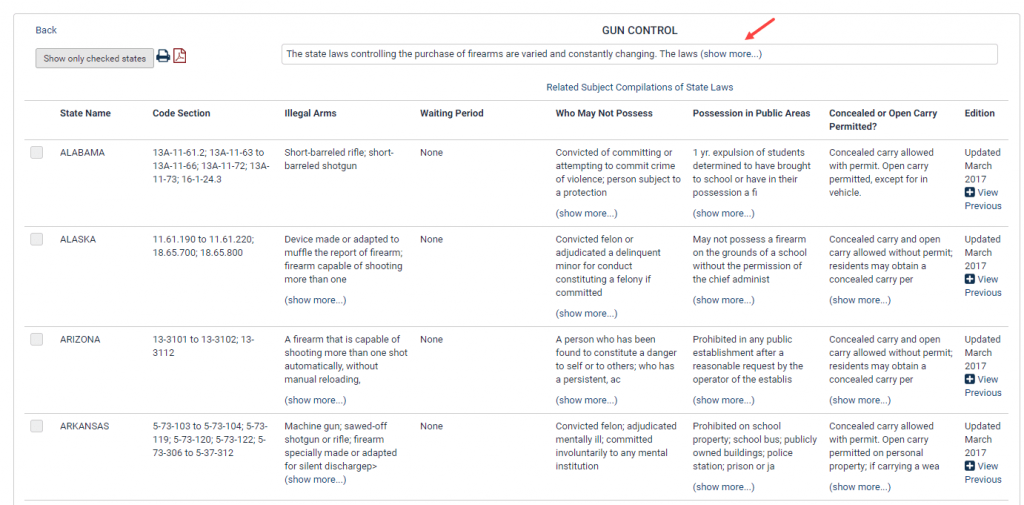
For another search example, navigate to the Subject Compilations of State Laws database. This database allows access to bibliographic records from Cheryl Nyberg’s Subject Compilations Bibliography Series, which contains extensive annotations with links directly to articles and other documents residing in HeinOnline. From within this database, click on Browse the Subjects.
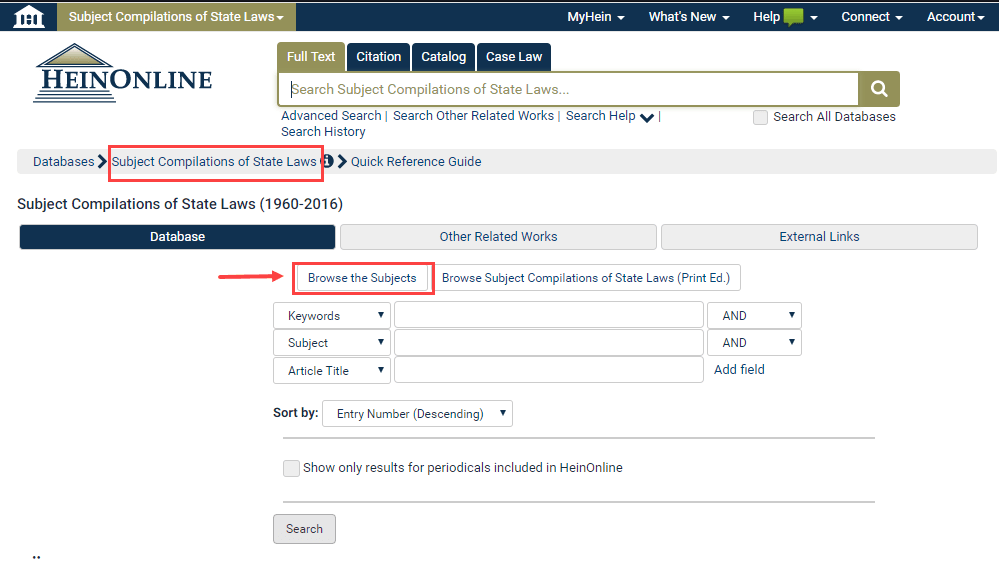
Scroll through the subjects and find firearms, which contains more than 300 results. Anything highlighted in blue can be found in HeinOnline.
Lastly, enter the Law Journal Library to search for scholarly articles on this topic. Using the Full Text tab, enter “mentally ill” AND “second amendment” and click the search button. From the results page, narrow down your search results using the facets on the left. For example, choose 2017 from the Date facet to drastically cut results.
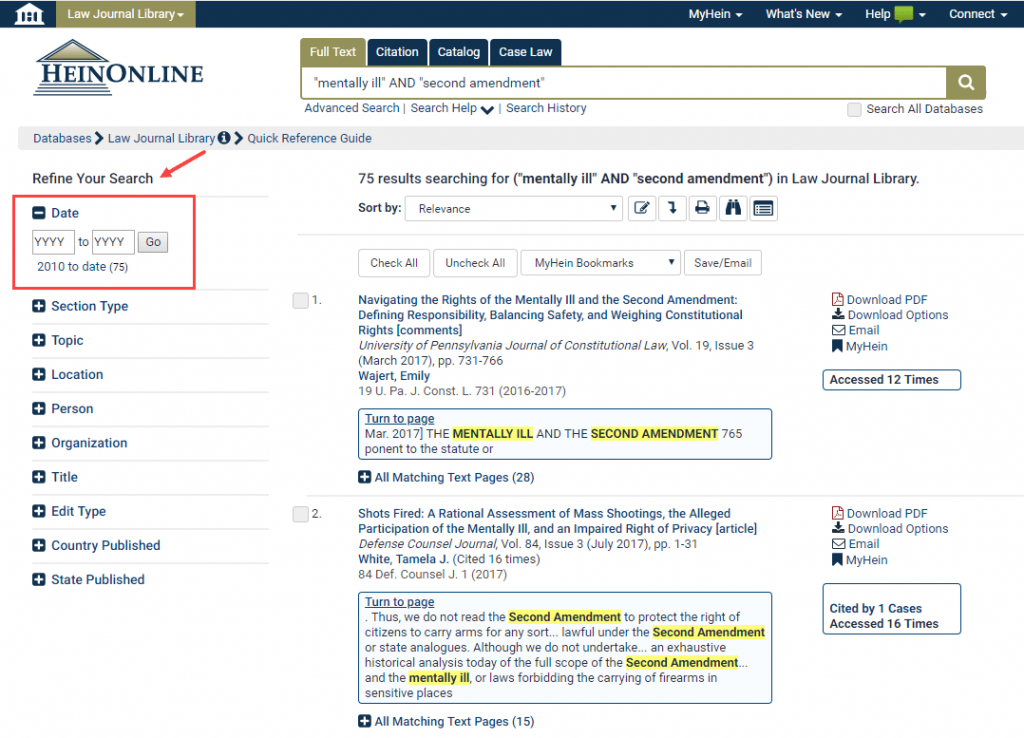
Users can also search by topic in the Law Journal Library. Choose the Advanced Search option and find the Topics section. Click on the Choose Topics search bar and find a topic from the list provided. For example, search for firearms. Users do not need to enter a text to search by topic. Simply click the search button to view results.
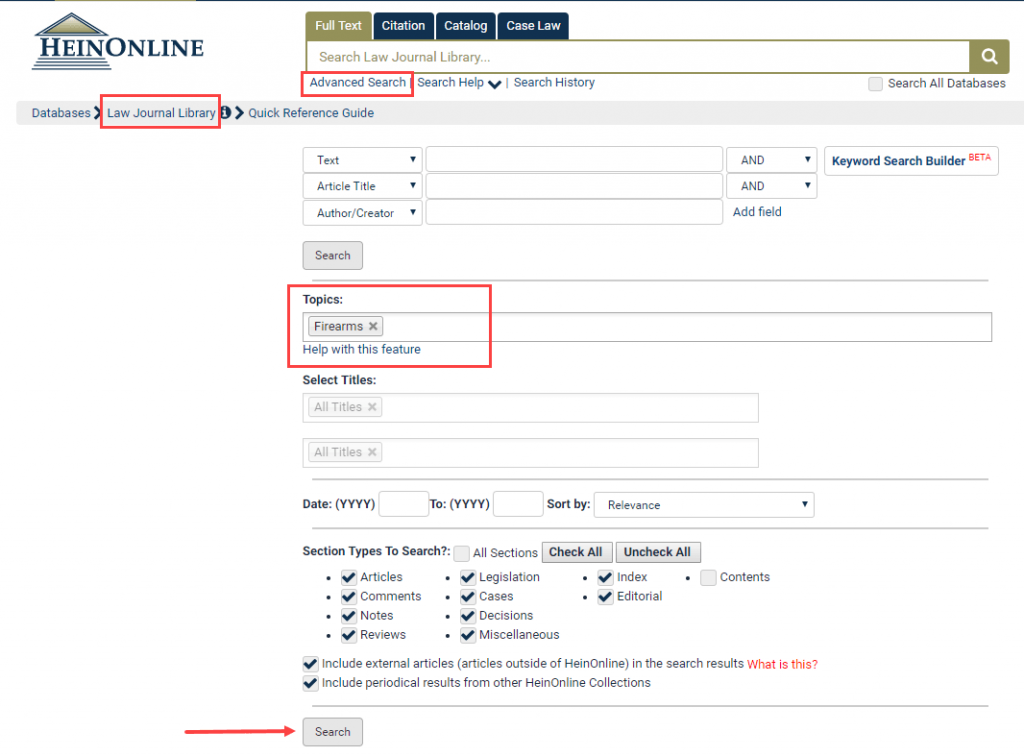
From the results page, navigate through the documents and find The Faces of the Second Amendment Outside the Home, Take Two: How We Got Here and Why It Matters. To continue researching this topic, users can click on the More Like This Button.
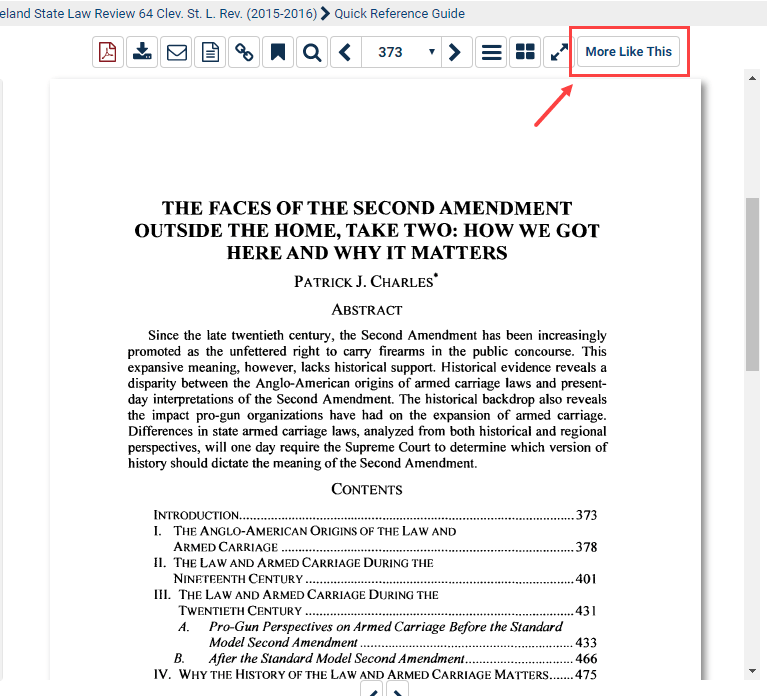
More Like This uses a program which finds “interesting words” in an article, as determined by an algorithm that analyzes the article’s text. Review the list of similar articles and adjust the boost factor on the interesting words as determined by the More Like This algorithm, or enter new terms to change the scope of the results.
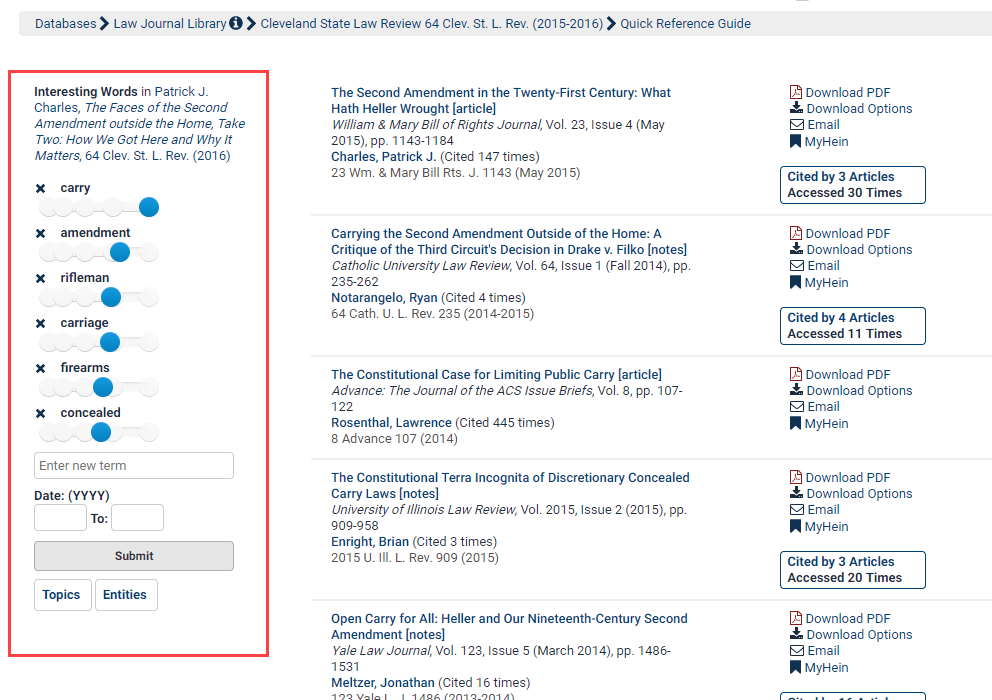
For help constructing searches or navigating in HeinOnline, contact our dedicated support team at (800) 277-6995, email us, or chat with us!


